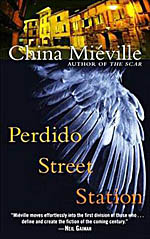
![]() couchtomoon
couchtomoon
10/29/2014
![]()
There is no doubt that China Miéville's Perdido Street Station is an acquired taste for the uninitiated, and even for the initiated--those of us who were raised on the strange and squishy, green-tinted worlds of Roald Dahl animated features, and the obstructive prose of Lovecraft and his buddies. At times, it's bumbling and immature, while also being rich and immense. But it almost always overwhelms as an ambitious sensory experience that not all readers will be prepared for.
Isaac Dan derGrimnebulin, a brilliant yet erratic theoretical physicist, is approached by a wingless garuda who seeks his help to regain flight, providing ample opportunity for Isaac to tinker with his passion for chaos theory. Isaac's lover, the avant-garde artist Lin, a self-imposed exile of the Kepri community, whose insectile anatomy forces her relationship with Isaac into the unacknowledged shadows, is vetted by the mobster kingpin Mr. Motley to produce a life-size statue of his monstrously modified physique. Both lovers are offered a level of challenge and compensation that they cannot resist, which lures them deeper into the dark and dangerous underworld of New Crobuzon.
[WARNING: Semi-braggy personal disclosure in the next two paragraphs. Detour if you want. I feel like sharing today.]
I first attempted to read this novel years ago, in the midst of a fiction dry spell, my perpetually uninformed and disappointing hunt for quality and satisfying genre fiction. I was busy, my head chock full of social justice headlines and public policy, and inundated with peer-reviewed social science and historical research. The unreliable hordes of Amazon reviews were my only reference guide for fiction, and somewhere in that clusterfuck I gleaned that Miéville might be an author of like mind. Like many of us who enjoy reading and analyzing speculative fiction, I was overeducated, world-weary, and I desperately craved a foray into the fantastic. One of my inept trips to the library resulted in a stack of fiction books half my height, hardly any of which I can remember. Except for two: Perdido Street Station and a compendium of Lovecraft short stories.
Then I got the busies, and then summer suddenly happened, which left a half-read Miéville neglected on my bedside table. The return date was looming, a beach apartment in the south of Spain was waiting, and I had a luggage limit to adhere to. This was before my conversion to the digital reading experience, so I was forced to commit the crime of weight limit book triage, the hefty Perdido was returned to the library and, another strange recollection, the Lovecraft bit made the cut. (How to de-horrorfy Lovecraft: read him on a sunny beach beneath a rainbow-striped umbrella.) Perdido was a no go because I found it clunky (both in size and scope), detached, and too bizarre.
Clunky, detached, and too bizarre... yes. And no.
Language lovers will both love and despise this novel with equal enthusiasm. We get lovelies like these rhythmic and florid little snatches:
But, we also get trippy, multisyllabic adverbs. Trippy in the sense that the eyes will unceasingly trip over these complicatedly, perilously placed hazards. A few, fastidiously selected examples:
And, of course, what kind of reviewer would I be without a promised final gross out tally? (This reformed atavist thanks you, digital spyglass icon):
Best (worst) uses of effluvial lingo:
But the names. Oh my god, the names. Dan derGrimnebulin. Lucky Gazid. Cornfed. Teafortwo. Teafor-effing-two. I want a pet, just so I can name it Teafortwo. Miéville wins the contest for best character names ever.
I've nitpicked too much, but only because it's funny I suspect the flamboyant prose, dense adverbs, and sordid language are to blame for deterring readers from enjoying this novel and this author. This is early, unnurtured Miéville. Words are his toys and he plays with them lasciviously. (10 occurrences of the word "lascivious" and its variants, btw.) We know from The City & the City (2009) that Miéville can be restrained (whether this is due to skills development or style mimicry I am not sure yet). Yet, in Perdido Street Station, Miéville is like a German shepherd puppy bounding after language with overlarge paws. The enthusiasm is endearing, even if it is sometimes clumsy and pee-stained.
The imaginative scope of this novel is where we should praise and envy, and the monsters are the best part. Colossal nightmares of Lovecraftian dimension, we meet: surgically-altered reMade beings with creaturific appendages; muscular cactus bipeds; a giant, glossy 4-D spider that behaves as a fearsomely esoteric Jiminy Cricket; mindlessly powerful slake-moths who feed on the subconscious ether of sapient beings; and a self-aware junkyard construct called the god machine, which spies through a sentient Roomba.
And the world-building. Yes, the world-building. It's there, never burdening the narrative, because there are so many other burdens going on. Just the squishy scum gutters and sharp-edged green-tinted oxidation that this BFG fan desires, and this grown career woman should sniff at. I'm experiencing dissonance here! Don't look! (<– I stole this from, Matt. Thanks, BBB!)
But I think that's where we wind up. A fantasy novel with cartoony adult characters in a setting presented with childlike awe. Miéville confuses our sensibilities with his snot-colored gutter world and charms us with his awe-ful imagination. Its ugliness is gorgeous. Its jaggedness, gratifying. Its grotesque, visceral imagery seems adult, yet it tugs at the child within. For that reason, this novel cries out for animation. It needs pictures between the pages. It needs squiggly, scrawly motion picture treatment in green and sepia tint.
I can see why this novel divides genre readers so. Ten years ago, I abandoned the book. Today, I'm pleased that I finished it, and I'm satisfied despite its flaws. RICH BREWS SIT UNEASY ON THE PALATE, the Weaver warns. Well, this brew is certainly rich, and no, it won't go down easy.
But you should still have a taste.
http://couchtomoon.wordpress.com